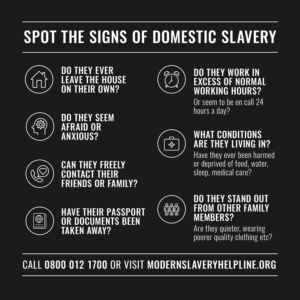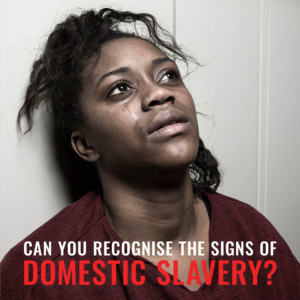Poll survey on modern slavery yields shocking results among UK Nigeria

Results from a recent straw poll on Modern Slavery, taken by 214 consumers of African media in the UK, show a worrying percentage of those surveyed believe they have witnessed Domestic Slavery.
The poll survey ran in conjunction with the modern slavery pilot campaign in partnership with The Salvation Army and child protection charity AFRUCA. The campaign focusses specifically on domestic slavery. Someone is a victim of domestic slavery if they are forced to work in someone’s home in unacceptable conditions for no pay or meagre pay and with no – or limited – freedom.
The poll was designed to gain a greater understanding of the public’s awareness of modern slavery and to get a grasp of how prolific this hidden crime really is.
Modern slavery doesn’t discriminate and evidence shows this is an issue spanning many nationalities. The pilot campaign has a particular focus on the Nigerian community in the UK as evidence shows Nigeria to be the country of origin with the highest number of referrals relating to domestic slavery.
The results from the poll show that overall the public has a good awareness of modern slavery existing in the UK with only 6% of those surveyed believing modern slavery no longer occurs. Over 60% were correct in thinking all of the indicators listed such as being trafficked, being victim to emotional or physical abuse or being forced into a marriage constitute to modern slavery.

In terms of domestic slavery in particular, 70% of those surveyed were correct in thinking the list of 11 abusive behaviours such as being beaten by an employer, not being allowed outside or having documentation taken away, constitute to domestic slavery. This shows a sound knowledge of domestic slavery which makes the fact that 17% have said they believe they have seen someone living in domestic slavery, very worrying. This is a shocking finding and highlights the need for better reporting.
Encouragingly, just over 60% saying they would report suspicions to the Modern Slavery Helpline and over 68% saying they would inform authorities but this percentage needs to increase. Unsurprisingly options to speak to the family, the victim or someone in the community proved popular also. Those who witness domestic slavery can be reluctant to come forward for fear of making the situation worse for the perpetrators and the victims. The campaign works to dispel this myth in order to see a surge in cases reported.
Those who have witnessed domestic slavery or any other form of slavery can call the confidential Modern Slavery Helpline which forms the link between community groups, NGOs and government organisations which provide specialist services to the individuals who have found themselves living in modern slavery.
If you’d like to report a suspicion, get help, advice or information call The Modern Slavery Helpline on 08000 121 700 or visit the website: www.modernslaveryhelpline.org The survey was taken by 216 people at the time of this article’s publication.








